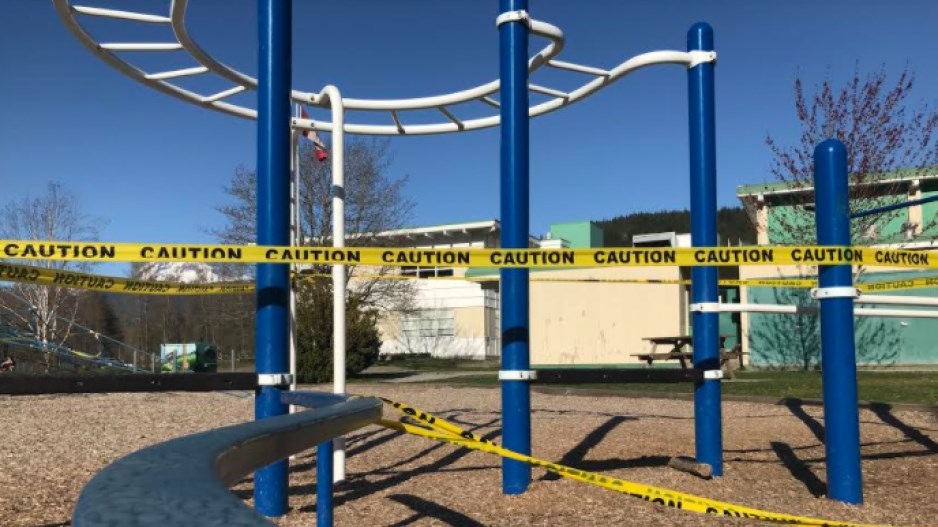One in a series of four stories from British Columbian communities reflecting on how they dealt locally with the pandemic in 2020.
The COVID-19 pandemic swept through Squamish, upending businesses, schools, municipal operations and more.
Up until March, the pandemic felt like an abstraction – something that was happening in another part of the world with little relevance to life in town.
But then came the lockdown.
In early March, provincial health officer Dr. Bonnie Henry ordered events with 250 people or more to be shut down. That number would later shrink to 50. Bit by bit, businesses were ordered to shut and schools were closed.
The week of the first order felt like the twilight zone.
Grocery store shelves were emptied as people started hoarding food. Pharmacies were working overtime as people panic-bought medications.
And something that had previously been a meme that locals poked fun at – the panic-buying and hoarding of toilet paper – became a reality in Squamish.
In the immediate aftermath of Henry's orders, toilet paper and cleaning wipes were scarce.
Throughout the province, outbreaks have been happening with alarming frequency in seniors' homes. However, in Squamish, as of Dec. 10, there have yet to be any outbreaks in local care homes, according to Vancouver Coastal Health.
On the business side, the town hasn't been quite as lucky.
With the exception of grocery stores, virtually every business in town has fared worse.
Those particularly hit hard were restaurants, bars and clubs. Restaurants have seen revenue shortfalls as in-person dining restrictions were imposed, but many were able to survive with takeout services intact.
Bars and clubs, however, have been in a harder situation, as their services haven't lent themselves well to take-out. Two iconic institutions were forced to close.
The Shady Tree pub is now gone. In its place is a drive-thru COVID-19 testing site.
The Knotty Burl, the town's primary nightclub and live music venue, has permanently closed.
Businesses haven't been the only institutions affected.
Municipal hall has been forced to cope with the restrictions imposed by the pandemic.
In-person council meetings have been put on hold indefinitely, and meetings have migrated online. Council's business has been held on Zoom, mirroring the world in which most white-collar work now finds itself.
Instead of gathering at council chambers, viewers can now see their elected officials in their natural habitats at home, at their desks with blurry computer cameras and spotty audio.
While the online platform has been functional for the most part, there have been challenges.
Council meetings, for example, are no longer as accessible to those without good internet connections, and the new format has erected another barrier to some people hoping to voice their opinions during public hearings.
This was criticism lobbed at elected officials during the zoning overhaul, which occurred in the middle of the pandemic.
A remote viewing area for council meetings was set up in Brennan Park, allowing people to speak into a microphone and address elected officials online during hearings, but that has been closed as of the latest health order this month.
But not all of council's moves were criticized. One item in particular was given a warm reception. This year, the municipality extended the due dates for property taxes, giving people extra time to make those annual payments.
Schools have also had to make significant adjustments. In the early days of the pandemic, in-person classes were mostly shut down. Learning was facilitated online and parents had to quickly step into the role of homeschool teachers.
High school graduation this year was also changed. The ceremony was broken up over several days with limits of 50 people.
Schools reopened in September, amid much concern from parents and guardians. Many were worried the conditions weren't safe, but public health officials maintained that their protocols had reduced risks to acceptable levels.
Since then, a number of COVID-19 exposures have occurred, with the high school, Howe Sound Secondary, having the majority of them in recent weeks.
The return to school prompted much debate over what constitutes safe pandemic protocols. At the direction of the province, the Sea to Sky School District divided students into learning groups that are between 60 to 120 people. These are bigger bubbles where students can interact closely.
However, some parents were alarmed that masks were not made mandatory at all times, and some teachers expressed concern that people from different groups would be in the same classroom.
Despite a recent sweeping mandatory indoor mask health order, schools are still not required to wear masks at all times. Officials say schools are self-contained environments and don't need this requirement, but some parents and teachers have been skeptical.
At least some parents were also concerned about what they considered to be a delayed or incomplete notification system for COVID-19 exposures in schools.
In the meantime, the debate over mask usage has stretched into the wider community. Most people are compliant, but online, many people have been propagating anti-mask misinformation, as well as unfounded theories that COVID-19 either doesn't exist or isn't harmful.
As of Dec. 9, Health Canada authorized the Pfizner-BioNTech COVID-19 vaccine and Squamish, like the rest of the country, is now waiting to hear when its residents will be able to receive doses.




